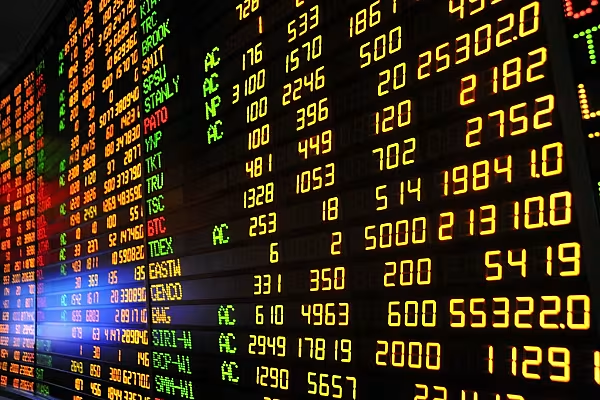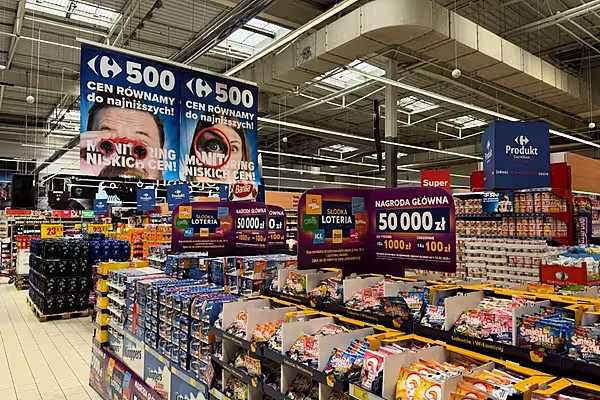European stocks pared declines as investors weighed the implications of Donald Trump’s victory in the race for the White House.
The Stoxx Europe 600 Index lost 0.7% at 9:11 a.m. in London, trimming an earlier drop of as much as 2.4 percent. Banks and automakers led declines amid a stronger euro. Losses were tempered by a rally in health-care stocks, which have suffered amid speculation Hillary Clinton would push for drug-price controls as president. Novo Nordisk A/S and Shire Plc rose at least 4.8%.
A win for Trump is a further setback for a bloc that has had to contend with the U.K. secession vote, as well as doubts over the health of its lenders and the efficacy of central-bank stimulus. While those concerns hurt companies dependent on domestic demand earlier in the year -- just as a strengthening U.S. economy helped buoy exporters -- the tables turned in the past weeks amid angst that the outcome of the presidential election could dampen global trade.
“A Trump win is expected to damage trade," said James Butterfill, head of research and investment strategy at ETF Securities in London. He’s been in the office since 3:30 a.m. “Traders are already expressing their worries through a depreciating dollar, which is bad news for European companies. Another problem for Europe is that there’s a populist wave going on, and this adds momentum to that. It’s worrying because we have so many elections coming up over here.”
Spanish lender Banco Bilbao Vizcaya Argentaria SA, which has high exposure to emerging markets like Mexico, lost 6.2%, while Banco Santander SA fell 2%. Credit Suisse Group AG, reliant on the Americas for more than a third of its revenue, retreated 3.5%. German carmaker Daimler AG dropped 5%. Vestas Wind Systems A/S, which sells wind turbines in the U.S., dropped to a four-month low on concern Trump’s victory threatens investment in renewable energy. Randgold Resources Ltd. and Fresnillo Plc jumped as gold soared the most since the Brexit referendum.
Health-care companies headed for their biggest jump in two months after suffering in recent weeks amid disappointing earnings reports, while Citigroup Inc. cut its rating on the firms in September, citing U.S. election risks. Drugmakers make up 13% of the Stoxx 600, the biggest sector weighting. GlaxoSmithKline Plc said on Tuesday that pressure on drug prices in the U.S. will continue regardless of who wins the presidency.
Here are the moves for the region’s major national indexes:
Germany’s DAX Index lost 2.2%, led by Daimler. France’s CAC 40 Index fell 1.9%, led by Axa SA. The U.K.’s FTSE 100 Index slid 0.6%, dragged by banks and energy producers. Spain, Portugal and Italy posted the biggest losses in Europe.
A Goldman Sachs Group Inc. index of European firms that get about half of their sales from the U.S. declined 5.9% from the market’s peak in September through yesterday, compared with a drop of just 2.4% for a gauge tracking companies that mostly rely on Europe. European firms that sell to America have fared better than members of the domestic-exposed measure every year but one since 2008.
European companies get about 17% of their total revenue from North America, with those in Belgium, Ireland and Switzerland among the most exposed, Morgan Stanley estimated in May. Europe is also the only region in the world that gets the majority of its sales from overseas, making it particularly vulnerable to global economic and political risks and to currency fluctuations. The euro earlier rose as much as 2.5% against the dollar -- a stronger euro makes European products less competitive abroad.
Through Tuesday, the Stoxx 600 had already lost about twice as much as the S&P 500 Index since a high on Sept. 5, while the region’s volatility gauge posted its second-longest run of gains on record. The European equity measure fell to a four-month low on Friday, completing its longest stretch without progress since 1994, amid a global selloff as the Federal Bureau of Investigation reignited controversy over Hillary Clinton’s e-mails. A subsequent second exoneration provided a fillip for the shares in the past two days.
“The strong trading links and the fact that major European companies are pretty active in the U.S. make this a pretty significant outcome for stocks over here,” said Dirk Thiels, head of investment management at KBC Asset Management in Brussels. “A Trump win just injects uncertainty. We don’t know exactly what his plans are and to what extent he’ll be able to implement his policies.”
News by Bloomberg, edited by ESM. To subscribe to ESM: The European Supermarket Magazine, click here.














